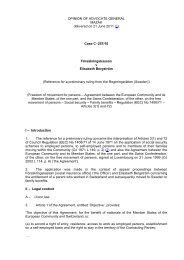Study on non-legislative initiatives for companies to promote gender ...
Study on non-legislative initiatives for companies to promote gender ...
Study on non-legislative initiatives for companies to promote gender ...
Create successful ePaper yourself
Turn your PDF publications into a flip-book with our unique Google optimized e-Paper software.
130 Gender equality <strong>initiatives</strong><br />
• Gender equality as a dynamic process: Most of the <strong>initiatives</strong> set their<br />
assessment criteria based <strong>on</strong> the c<strong>on</strong>cept of <strong>gender</strong> equality as a dynamic<br />
process rather than a status quo. Enterprises do not <strong>on</strong>ly have <strong>to</strong> prove<br />
achievements with regard <strong>to</strong> <strong>gender</strong> equality but commit themselves <strong>to</strong> a<br />
c<strong>on</strong>tinuous ef<strong>for</strong>t <strong>to</strong> ameliorate the situati<strong>on</strong>. Gender equality can not <strong>on</strong>ly be<br />
measured by figures but also becomes manifest in a change of c<strong>on</strong>sciousness<br />
am<strong>on</strong>g the <strong>companies</strong>’ staff and management, and <strong>initiatives</strong> can be seen as<br />
being part of that process. Thus, e.g. many labels <strong>for</strong>esee an auditing process<br />
and are <strong>on</strong>ly granted <strong>for</strong> a limited period of time.<br />
• Professi<strong>on</strong>al organisati<strong>on</strong>: C<strong>on</strong>cerning the organisati<strong>on</strong> the postulate is<br />
service orientati<strong>on</strong>. The clearer the requirements and the easier the administrati<strong>on</strong><br />
the rather <strong>companies</strong> will c<strong>on</strong>sider the participati<strong>on</strong>. If questi<strong>on</strong>naires or <strong>on</strong>site<br />
visits are <strong>for</strong>eseen, there should be substantial support <strong>to</strong> guide the <strong>companies</strong>.<br />
The implementing organisati<strong>on</strong>s have <strong>to</strong> ensure that the applicati<strong>on</strong> or<br />
participati<strong>on</strong> process proceeds as smooth as possible.<br />
• Clear m<strong>on</strong>i<strong>to</strong>ring and evaluati<strong>on</strong> criteria: Transparency with a view <strong>to</strong> the<br />
assessment criteria is crucial <strong>to</strong> reach credibility and comparability. Clear indica<strong>to</strong>rs,<br />
the regular review of commitments by requiring annual reports, the assessment<br />
of self-evaluati<strong>on</strong>s by an independent expert jury are good practice<br />
examples. Moreover, the selecti<strong>on</strong> or auditing process should be documented.<br />
Comprehensive and detailed feedback <strong>to</strong> the accepted and rejected candidates<br />
can initiate the desired learning process.<br />
• Publicity: To underline the relevance of a n<strong>on</strong>-<strong>legislative</strong> initiative adequate PR<br />
measures are required. This can, <strong>on</strong> the <strong>on</strong>e hand, increase the awareness of<br />
the initiative itself and its issues and, <strong>on</strong> the other hand, benefit the enterprises<br />
with a view <strong>to</strong> their public image (see chapter 3.3.1). Prestigious locati<strong>on</strong>s <strong>for</strong><br />
the awarding cerem<strong>on</strong>ies or the sp<strong>on</strong>sorship and men<strong>to</strong>ring of celebrated<br />
pers<strong>on</strong>s emphasise the public interest.<br />
• Creati<strong>on</strong> of binding commitments: All these fac<strong>to</strong>rs can c<strong>on</strong>tribute <strong>to</strong> the<br />
success of the initiative which is highly dependent <strong>on</strong> the creati<strong>on</strong> of binding<br />
commitments of the management as the success of all <strong>gender</strong> equality<br />
measures highly depends <strong>on</strong> the engagement of the management and is mainly<br />
a <strong>to</strong>p-down management strategy.<br />
4.2.2 Challenges and obstacles<br />
N<strong>on</strong>-<strong>legislative</strong> <strong>initiatives</strong> can indeed c<strong>on</strong>tribute <strong>to</strong> <strong>gender</strong> equality in the labour market<br />
and particularly in participating enterprises and various positive impacts in <strong>companies</strong><br />
could be identified. Nevertheless, these pros have <strong>to</strong> be c<strong>on</strong>trasted with the obstacles<br />
and challenges <strong>for</strong> the <strong>initiatives</strong>:<br />
• Diversity of participating enterprises: Initiatives promoting <strong>gender</strong> equality<br />
are well known am<strong>on</strong>g <strong>companies</strong> which are aware of the importance of a<br />
positive corporate culture and their corporate social resp<strong>on</strong>sibility. Thus, participati<strong>on</strong><br />
rates are high am<strong>on</strong>g the “usually suspects” and it can often be observed<br />
that awarded or labelled <strong>companies</strong> are also active in <strong>initiatives</strong> with another<br />
CSR or diversity focus. This entails two questi<strong>on</strong>s: How could other enterprises<br />
be motivated <strong>to</strong> dare the “adventure” and the risk of being assessed externally<br />
and of bringing new principles in<strong>to</strong> the company’s organisati<strong>on</strong>? And how can a
















